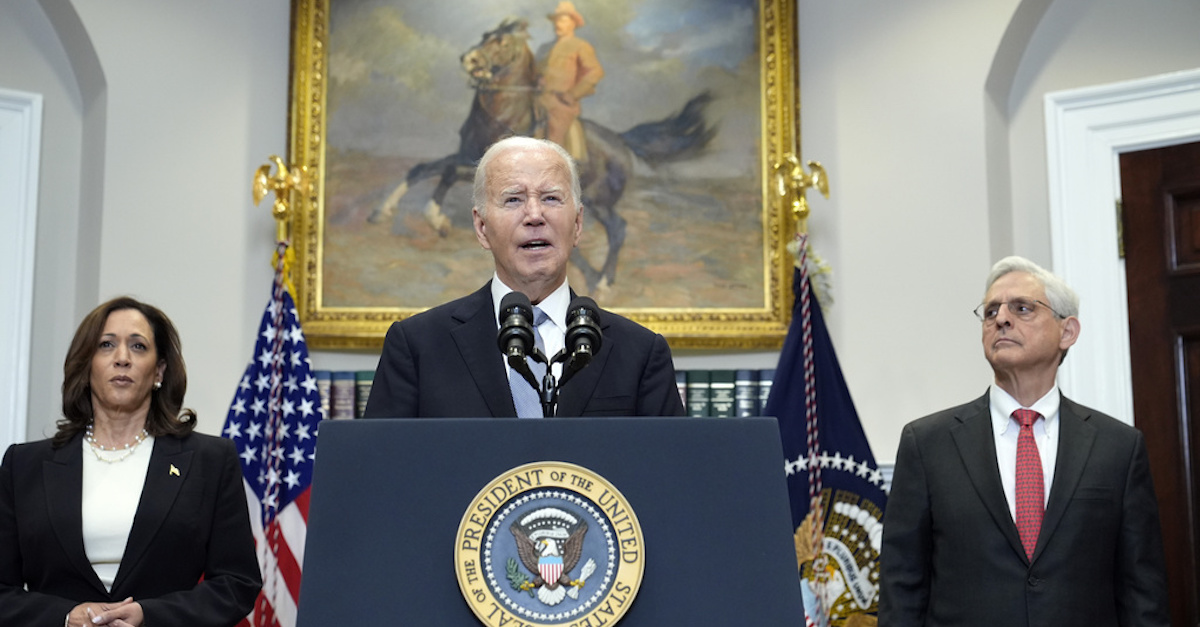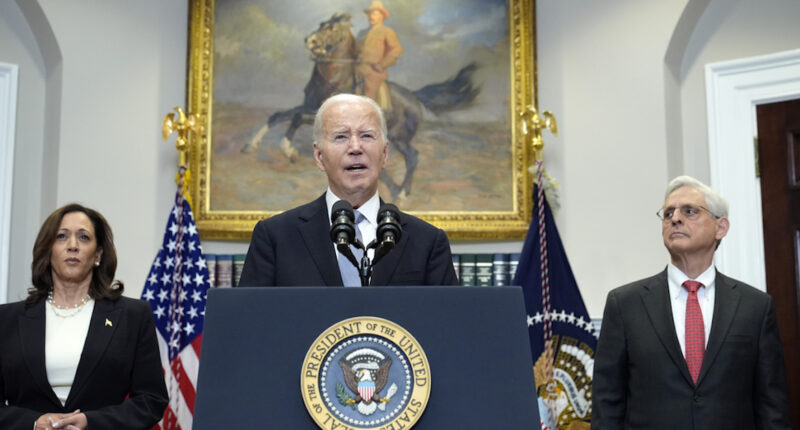
On the left side, you can see Vice President Kamala Harris. In the center, President Joe Biden is speaking from the Roosevelt Room. On the right, there is Attorney General Merrick Garland (AP Photo/Susan Walsh).
The formal mouthpiece of the federal judiciary, in a rare rebuke, criticized President Joe Biden for vetoing a bill that would have created several dozen new federal judges over the next decade.
Once supported by Democrats, the Judicial Understaffing Delays Getting Emergencies Solved (JUDGES) Act was abandoned by the president’s political party after Vice President Kamala Harris lost the 2024 presidential election to President-elect Donald Trump.
The Senate passed the act unanimously in August. The House of Representatives passed the act this month by a vote of 236 to 173.
On Monday, Biden nixed the bi-partisan legislation, saying the effort “seeks to hastily add judgeships with just a few weeks left in the 118th Congress,” according to a White House statement.
“The House of Representative’s hurried action fails to resolve key questions in the legislation, especially regarding how the new judgeships are allocated, and neither the House of Representatives nor the Senate explored fully how the work of senior status judges and magistrate judges affects the need for new judgeships,” Biden’s veto message continues. “The efficient and effective administration of justice requires that these questions about need and allocation be further studied and answered before we create permanent judgeships for life-tenured judges.”
In a Christmas Eve rejoinder, Judge Robert J. Conrad, Jr., the Director of the Administrative Office of the U.S. Courts, blasted Biden’s late-game removal of the ball as “extremely disappointing.”
“The President’s veto will contribute to the pattern of growing caseloads and increasing backlogs that hurt litigants and weakens public confidence in our courts,” the missive reads. “We appreciate the support of Congress and look forward to working with them to enact essential judgeship legislation.”
Established in 1939, the Administrative Office is the central support organization for the federal judiciary; its representatives are considered the closest thing to a unified voice for federal judges.
The organization slammed Biden for vetoing legislation that would have considerably lightened the load at the trial court, or district court in judicial parlance, level by creating 66 new judgeships across the country in stages over the next several years.
“Providing additional judgeships is essential to improving access to the courts and necessary for the efficient and effective administration of justice,” Conrad said.
The spokesperson went on to cite a recent letter addressed to Biden that preemptively aimed to counter criticisms that had been emanating from Washington, D.C. in advance of the veto.
From that letter, at length:
We need judges now. S. 4199, the Judicial Understaffing Delays Getting Emergencies Solved (JUDGES) Act is necessary to the efficient and effective administration of justice. It is consistent with the Conference’s most recent judgeship recommendations. It is based on objective caseload data, assuming all vacancies are filled. The Conference review process incorporates the work of senior and magistrate judges into its recommendations. The bill has not been hastily drawn up, but is the product of years of study, analysis, and congressional review.
This legislation would address the need for additional district court judgeships, spreading them out over the next three Presidential administrations. The bill passed the Senate earlier this year by unanimous consent, and recently passed the House with bipartisan support. It is critical to the federal Judiciary that this bill become law, to improve access to justice and to enhance judicial administration.
In his veto statement, the 46th president said one reason he opposed the bill was due to the prevalence of extant judicial vacancies.
“S. 4199 would create new judgeships in States where Senators have sought to hold open existing judicial vacancies,” Biden wrote. “Those efforts to hold open vacancies suggest that concerns about judicial economy and caseload are not the true motivating force behind passage of this bill now.”
“The judgeship legislation presented to the President reflects decades of work by the federal Judiciary and is very similar to legislation introduced in the last Congress,” Conrad said. “It is not a bill that was hastily put together. Rather it is the product of careful and detailed analysis which considers primarily the weighted caseload per active judge in each judicial district, while also factoring in the contribution of senior judges, magistrate judges and visiting judges.”
The agency’s spokesperson went on to castigate Biden for what is framed as an aberration from long-practiced federal norms.
“This veto is a deviation from the long historical pattern of approving judgeship bills that awarded new judgeships to sitting Presidents,” the statement goes on. “The President’s veto is contrary to the actions of Senator Biden who helped pass many of those bills. It is regrettable that the Administration failed to support the federal Judiciary, and rejected this bipartisan, bicameral and interbranch agreement.”








